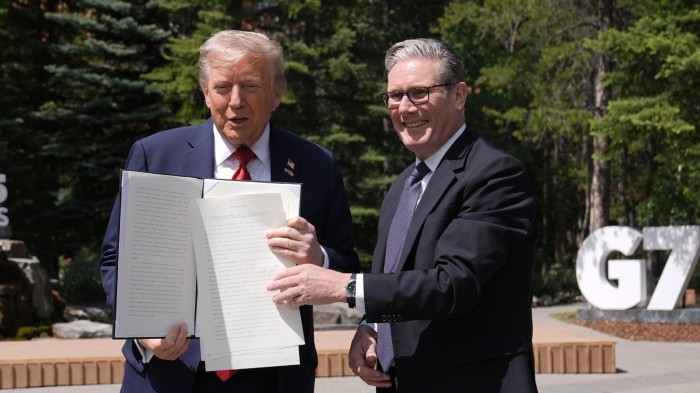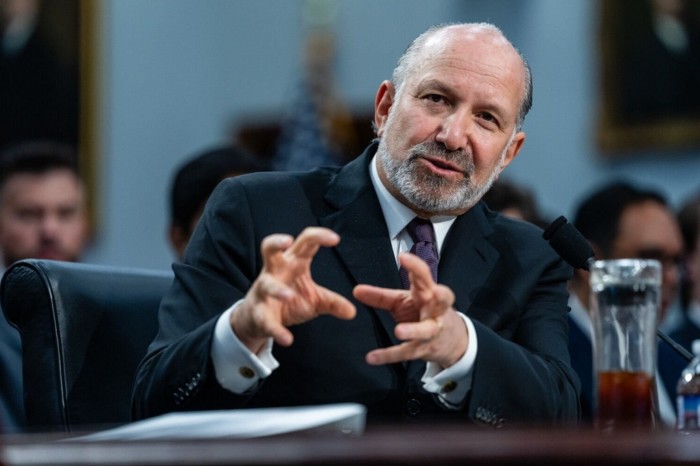Trump signs executive order to implement US-UK trade deal

Unlock the White House Watch newsletter for free
Your guide to what Trump’s second term means for Washington, business and the world
Donald Trump has signed an executive order to implement his US trade deal with the UK, but while British carmakers and aerospace manufacturers are set to secure quick benefits, steel producers could have to wait longer.
The president’s order will “operationalise” the US-UK agreement, under which Trump agreed to cut a 27.5 per cent American tariff on cars to 10 per cent for the first 100,000 vehicles shipped from the UK each year.
The deal will also ensure UK exports of jet engines and other aerospace components to the US are spared from American tariffs.
The waiving of aerospace tariffs is confirmation the UK will be exempted from any levies that emerge from a US national security probe that Trump has launched into the industry.
In the US-UK trade deal unveiled by Trump on May 8 in the Oval Office, there was a promise that Britain would be spared from some national security tariffs if it met Washington’s requirements to exclude China from critical supply chains.
The UK is the only country to have struck a trade agreement with the US since Trump launched his sweeping “liberation day” tariffs in April, threatening America’s trading partners with levies of up to 50 per cent. He subsequently paused the tariffs for 90 days.
UK Prime Minister Keir Starmer has come under political pressure at home to implement the trade deal quickly, notably from industries affected by the tariffs.
Trump and Starmer met briefly on Monday on the margins of a G7 summit in Kananaskis, Canada, to discuss the accord.
“We just signed it and it’s done,” Trump told reporters shortly after the meeting.
White House officials said Trump had signed the executive order that would implement the trade deal.
“This is a very good day for both of our countries, a real sign of strength,” Starmer said.
In return for cuts to Trump’s tariffs, the UK granted the US greater market access for beef, ethanol and industrial products.
The UK government said it expected the trade deal’s provisions affecting the British car and aerospace industries to take effect by the end of the month.
The text of Trump’s executive order directs US commerce secretary Howard Lutnick to formally change tariffs on UK goods within seven days of the document being officially filed.
The order also said the US would in future negotiate with the UK over any potential American pharmaceutical tariffs that it might apply.
The US-UK trade deal is meant to lower American tariffs on British steel and aluminium exports to zero, but there have been drawn-out negotiations over implementation of the plan.
UK officials said “technical and legal” issues were continuing to delay the confirmation of a quota that would enable British exporters to avoid a 25 per cent steel global tariff imposed by Trump on national security grounds.
Steel producers in the rest of the world are contending with a 50 per cent levy on their exports to the US after Trump doubled the existing 25 per cent tariff this month, but he offered the UK an exemption to allow time for implementation of the trade deal.
The negotiations have been complicated by how a significant proportion of UK steel is reprocessed from imported material and does not meet an American requirement that it is “melted and poured” in the country of origin to qualify for tariff exemptions.
UK steel industry bodies have said they do not expect arrangements consistent with the trade deal to be finalised until the end of the month at the earliest, and putting them into effect could take longer still.
A Downing Street spokesperson said talks between the UK and the US were continuing on steel.
“As the prime minister and President Trump have again confirmed, we will continue to go further and make progress towards zero per cent tariffs on core steel products as agreed,” they added.
The Society of Motor Manufacturers and Traders, the British automobile industry trade body, described the latest development on the US-UK trade deal as “great news”.
However, the decision to grant US ethanol producers a 1.4bn litre tariff-free quota, equivalent to the entire UK annual demand, has been attacked.
Britain’s bioethanol industry has warned the trade accord will destroy domestic producers.





